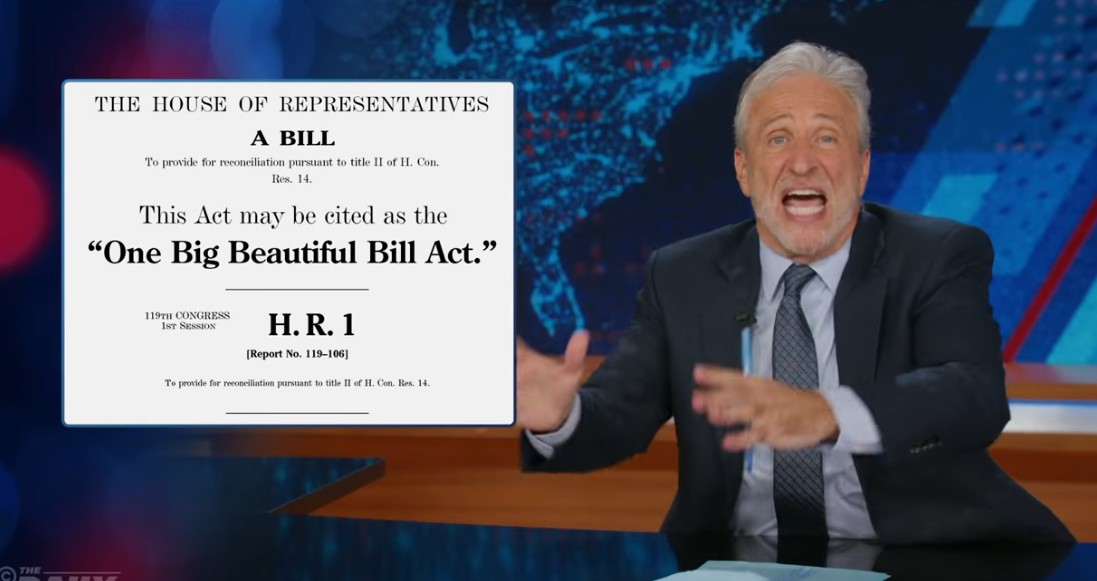
The Real Story Behind the “Cuts”Big Beautiful Bill”
Jon Stewart’s latest monologue isn’t just a comedic takedown of Washington’s latest tax and spending bill—it’s a diagnosis of a deeper American illness.
His thesis is as clear as it is uncomfortable: our political system, under the guise of fiscal responsibility, keeps rewarding the wealthy and powerful while punishing the people who need help the most. The “gospel of austerity,” as Stewart calls it, is less about balancing budgets and more about maintaining a status quo that benefits the few at the expense of the many.
The Math Doesn’t Lie But the Narrative Does
Stewart walks us through the numbers: nearly a trillion dollars cut from Medicaid, hundreds of billions slashed from food assistance, and millions of children losing access to school lunches. These are not abstract figures they’re real people, real families, real consequences. And yet, the bill doesn’t even do what its architects claim: it increases the deficit by$3.4 trillion. The safety net shrinks, but the national debt balloons.
This is the heart of Stewart’s insight. The story told by politicians is that we must tighten our belts, that the country can’t afford to be generous to the poor. But the reality is that the belt only tightens for some. The military gets a raise. Border enforcement gets a raise. The wealthiest Americans get permanent, generous tax cuts. The “winners,” as Stewart puts it, keep winning.
Hypocrisy as Policy
Stewart’s critique isn’t just about the numbers it’s about the process and the hypocrisy that underpins it. Republicans, who once railed against Democrats for rushing through massive bills, now do the same. Democrats, meanwhile, are powerless to stop the bill and even manage to brag about changing its name, as if that’s a victory. The media dramatizes the process, pretending every vote is a nail-biter, when in reality, the outcome is never in doubt.
This is all theater, Stewart argues. The “no” votes are scripted, designed to give certain senators plausible deniability without ever putting the bill at risk. It’s professional wrestling, but with higher stakes and less honesty.
The Lazy Trope of the “Deserving Poor”
Perhaps Stewart’s most incisive point is about the narrative that justifies these policies. The problem, we’re told, is not the excess at the top, but the supposed laziness at the bottom. Politicians and pundits paint a picture of able-bodied people living off the government, playing video games and eating Cheetos. Stewart demolishes this trope: the real scandal is that millions of Americans work full-time and still need help to feed their families and pay for healthcare.
The “deserving poor” are always under suspicion, while the “deserving rich” are endlessly rewarded. The system is designed to make it harder for the vulnerable and easier for the powerful. And every time the country faces a fiscal crisis, the solution is the same: cut from the bottom, protect the top.
A System on the Brink
Stewart’s thesis is not just a critique it’s a warning. The current system is unsustainable. Blaming migrants and the poor may win elections, but it doesn’t solve the underlying problems. When working people can’t get by, when the safety net is shredded, when the rich keep getting richer, something has to give.
If nothing changes, Stewart suggests, the country will face more drastic consequences. The “gospel of austerity” is a false faith, and sooner or later, Americans will demand a new deal.
The Takeaway
Jon Stewart’s insight is simple but profound: America’s political and economic priorities are upside down. The rhetoric of responsibility masks a reality of cruelty and inequality. Until we fix the system so that working people can actually thrive, no amount of tax cuts for the rich or spending on the military will make us a stronger nation.
